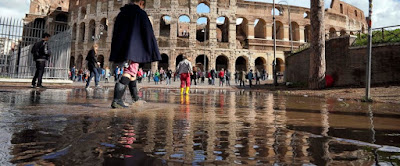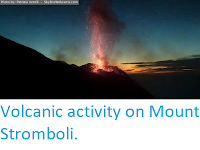At least fifteen people have died as a storm system swept across Italy and into Central Europe this week. The first fatalities occurred on Saturday 27 October 2018 at Crotone in Calabria, when a landslide hit workers carrying out emergency repairs to a sewer amid heavy rainfall, killing four. Landslides
are a common problem after severe weather events, as excess pore water
pressure can overcome cohesion in soil and sediments, allowing them to
flow like liquids. Approximately 90% of all landslides are caused by
heavy rainfall. Further deaths were reported on Monday 29 and Tuesday 30 October, as storm surges hit ports around the coast, heavy rain and snowfall fell across the north of the country, and central regions were hit by high winds and tornadoes, one of which killed a man in the city of Terracina in Latina.
Flood hit shops in Venice this week. EPA.
In the Alto Adige (or Sud Tyrol) Region in the far north a woman was killed when a landslide hit her house in Trento, where a fisherman was found dead some hours after going to check on a boat on a nearby lake, and a volunteer firefighter was killed in a separate incident. In the northern Emilia Romagna Region a 63-year-old kite-surfer died after being thrown against rocks near Rimini on the east coast. In the Veneto Region a 61-year-old man died after his car was swept away by a flash flood another man died after being hit by a falling tree, and the city of Venice was hit by a three metre storm surge, causing extensive flooding. In Naples a 21-year-old student was killed by another falling tree.
Landslide at Volterra in the Pisa Region of Italy this week. Twitter.
Problems continued later in the week, with a further four deaths reported on Thursday 1 November, with two further deaths in Trento, a man who fell from a roof while carrying out repairs and another man who died after a falling tree hit his car, and in the Val D'Aosta Region when another tree fell on a car with an elderly couple inside, killing them both.
A yacht belonging to Piers Berlesconi (son of the former Prime Minister Silvio Berlusconi) that sank in Rapallo Harbour, Genoa, during a storm this week. Reuters.
Elsewhere this week a number of luxury yachts were destroyed in the port of Rapallo in Genoa, where a storm surge described as 'reminiscent of a tsunami' broke through a harbour break wall and drove them onto the shore, and a number of luxury cars bound for export to the Middle East were destroyed in a fire at the port of Savona, thought to have been caused by salt water getting into a car battery during flooding.
Flooding near the Colosseum in Rome on Tuesday 30 October 2018. AP.
Most storms form due to heating of air over the sea in tropical zones. As
the air is heated the the air pressure drops and the air rises, causing
new air to rush in from outside the forming storm zone. If this zone is
sufficiently large, then it will be influenced by the Coriolis Effect,
which loosely speaking means the winds closer to the equator will be
faster than those further away, causing the storm to rotate, clockwise
in the northern hemisphere and anticlockwise in the southern hemisphere.
A road partially blocked by a wind-blown gazebo at Badia Prataglia in Tuscany. Arezzo Fire Brigade.
Whilst
the high winds associated these storms is extremely dangerous, the real
danger from such storms is often the flooding. Each millibar drop in
air pressure can lead to a 1 cm rise in sea level, and large storms can
be accompanied by storm surges several meters high. This tends to be
accompanied by high levels of rainfall, caused by water picked up by the
storm while still at sea, which can lead to flooding, swollen rivers
and landslides; which occur when waterlogged soils on hill slopes lose
their cohesion and slump downwards, over whatever happens to be in their
path.
See also...
Follow Sciency Thoughts on Facebook.











